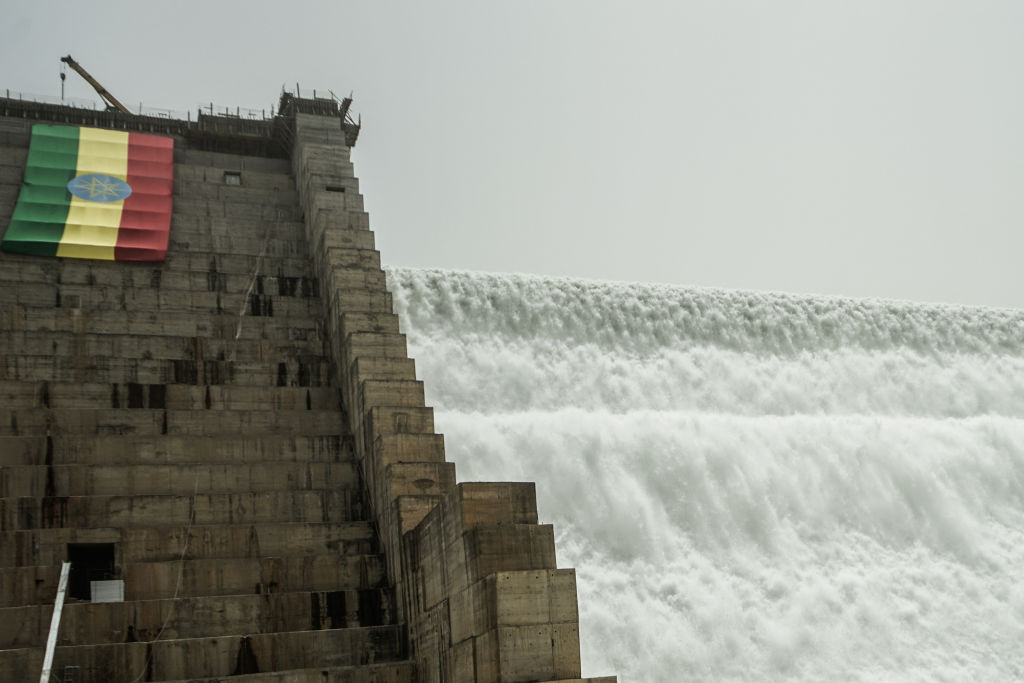ADF STAFF
The fifth filling of the Grand Ethiopian Renaissance Dam has raised more than the level of the hydropower dam’s sprawling reservoir: It has also raised tensions between Ethiopia and Egypt over control of the Nile River.
The most recent filling, which began in July, provoked an outcry from Egyptian officials, who insist that the dam is illegal and poses an existential threat to their country. Egypt gets more than 90% of its freshwater from the Nile.
Egyptian authorities say colonial-era treaties from 1929 and 1959 guarantee Egypt and Sudan a specific allotment of Nile river water. They see the dam, known as the GERD, as a tool by which Ethiopia can throttle the downstream water supplies in times of political tension.
“Ethiopia’s illegal policies will have serious negative impacts on the downstream countries,” Egyptian Foreign Minister Badr Abdelatty wrote in a recent letter to the United Nations Security Council.
In a separate letter to the U.N., Ethiopia described Egypt’s concerns as unfounded and called for it to “abandon its aggressive approach” toward the GERD project.
Ethiopia argues that the dam will relieve seasonal flooding in Sudan and store water as a hedge against future droughts. The dam generates electricity by passing water through turbines built into the structure, meaning the Nile’s flow will see little disruption after the project is finished.
Egypt and Sudan both have multiple dams on the Nile to provide power and irrigate crops.
The GERD, located near Ethiopia’s border with Sudan, has raised concerns downstream because it straddles the Blue Nile, which provides 85% of the Nile’s flow. The remainder comes from the White Nile, which originates in Lake Victoria and flows through Uganda and South Sudan before joining the Blue Nile in the heart of Khartoum to form the Nile River.
Ethiopia began filling the dam in 2020. Egypt says Ethiopia has ignored a 2015 agreement that called for an international panel to study the dam’s environmental impact. Ethiopia says the project is a national imperative, adding that its 5,000 megawatts of electricity will lift the country’s population out of poverty.
Early in the project, Egypt threatened to attack it militarily. Now, observers say, any physical damage to the structure would result in catastrophic downstream flooding.
Experts at the University of Manchester in the United Kingdom examined the dam and developed a plan by which the water and power it generates can be shared equitably among Egypt, Ethiopia, and Sudan. So far, however, none of those governments have expressed an interest in the plan.
With negotiations at an impasse since December 2023, Egypt has turned its attention to Ethiopia’s neighbors. Egypt recently signed a defense pact with Somalia and agreed to supply 5,000 troops to the new African Union-led Support and Stabilization Mission. In August, Egypt sent two planeloads of weapons and ammunition to Mogadishu, its first military aid to Somalia in more than 40 years.
Somalia is in the midst of its own dispute with Ethiopia over a port agreement with Somaliland, a breakaway region on the Red Sea that Somalia still considers its sovereign territory. The Somaliland deal gives Ethiopia access to the port of Berbera for commercial purposes and leases 20 kilometers of coastline for 50 years to build an Ethiopian naval base.
Somali authorities have threatened to support armed rebels in Ethiopia if the government of Prime Minister Abiy Ahmed continues its talks with Somaliland. Egyptian and Ethiopian leaders have both accused the other of taking actions that will destabilize the region.
Egypt and Somalia plan to conduct a variety of military exercises on land and sea that Hassan Nafaa, a professor at Cairo University, sees as a possible warning to Ethiopia about continuing to fill the GERD.
“It is not surprising that Egypt would seize the opportunity to deploy troops in Somalia,” Nafaa told the Atlantic Council. “It will also give Egypt a privileged position in the event of a confrontation erupting should Ethiopia make any further moves to harm Egypt or if the flow of the Nile is disrupted.”

